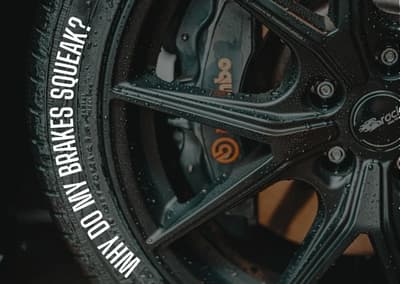Why do my brakes squeak?
If you have noticed that your brakes are squeaking then is important that you don’t disregard this. Squeaking brakes can be an indication of a more serious problem with the braking system or alternatively, this could be something simple that can easily be fixed.
If you do hear squeaky brakes on your car or van, it is important that you know all the potential reasons why this may be, as the brakes are an imperative part of the car and are essential to keeping yourself and other drivers safe on the road.

In this article, we are going to diagnose all the potential reasons why your brakes may be squeaking and what you can do to stop it.
What are the causes of squeaking brakes?
Weather conditions
Wet and cold conditions can be a cause of squeaking brakes. A build-up of moisture on the brakes can cause them to squeak due to the brake pads rubbing against the brake disc. Cold weather, especially freezing conditions, can freeze components of the brakes and also make them give off a loud noise. With wet and cold weather conditions, the squeaking may be most evident in the morning after leaving your car stationary overnight.
If the weather conditions are the cause of the squeaky brakes, when your car heats up after driving for an extended period of time, then the brake squeaking should stop.
Related: Batteries: Cold weather hints and tips
Heavy loads
Driving a car with a heavy load or a car full of passengers may also make the brakes squeak. This is because the added weight will put pressure on the brakes, causing them to use up more energy to bring your vehicle to a stop. A squeaking noise will be exerted because of this. The more you drive with this added weight, the hotter the brakes will become causing the metal to swell, making the noise more evident.
If you notice the squeaking noise with added weight in your car there is not a lot that you can do about this. However, it gives you peace of mind that the squeaking is caused by weight and nothing more serious.
If your brakes are squeaking, then we would still recommend booking in for a brake check at your local National Tyres and Autocare branch. To book an appointment to diagnose if there are any issues with your brakes, please click on the related article below.
Related: Brake check at National
Worn down brake pads
Worn brake pads are a common cause of brakes squeaking, and unfortunately are often one of the things that can cause the most problems. The purpose of the brake pads is to clamp onto the brake disc when you brake. This causes friction between the brake pads and the brake disc causing the vehicle to come to a stop. Due to the friction created, this will cause the brake pads to thin. This is what causes the squeaking noise.
The impact of thin brake pads will not only be a squeaking noise but also it will affect the performance of your brakes. It is recommended that you get your brake pads changed every 50,000 miles, however, they may need changing sooner and a squeaking noise can be an indication of this.
Related: 4 Signs your brake pads need changing
Objects in the brakes
As you drive debris such as dust, dirt, grit and stone can begin to accumulate in the brakes. If some of this debris is caught up in the brakes, you will hear it catching on the brake components. Most of the time this debris will make its own way out of the braking system and the noise will go away. However, if it is lodged then you may want to manually clean the brake disc, calipers and pads to see if this stops the brakes from squeaking.
Related: How to clean your brakes
How to stop squeaky brakes
As mentioned in this article there are a variety of different reasons why your brakes could be squeaking. Therefore, the best way to stop the squeaking is to identify the cause and act upon this. It could be as simple as cleaning your brakes, allowing your car to warm up or maybe you are due your brake pads changing.
If you do have a problem identifying the cause, book into one of our 250 nationwide garages at National Tyres and Autocare and a professional will see to any issues.
Related: Book a brake check at National
Did you enjoy this blog post? |29 people found this review helpful



 Sign up for SPECIAL OFFERS
Sign up for SPECIAL OFFERS
